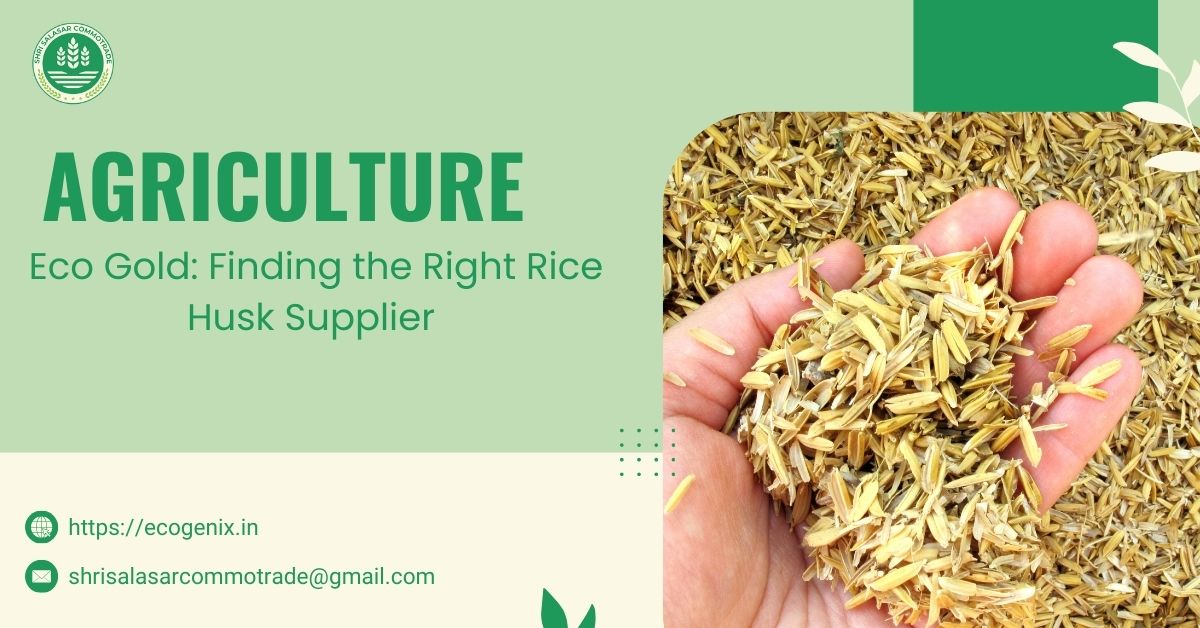
Introduction
In the world of modern industry, sustainability is no longer a trend—it’s a necessity. As businesses face growing pressure to adopt greener practices, one unlikely hero is gaining traction across sectors: rice husk. Once discarded as agricultural waste, rice husk is now considered “eco gold”—a renewable, versatile, and cost-effective material that powers everything from energy generation to eco-friendly product manufacturing. But tapping into its full potential depends heavily on one key factor: finding the right rice husk supplier. Whether you’re in manufacturing, construction, energy, agriculture, or packaging, choosing a dependable Rice Husk Supplier can transform your operations and significantly reduce your environmental impact.
Why Rice Husk is Considered “Eco Gold”
Rice husk is the protective outer shell of a rice grain, removed during the milling process. India, being one of the top rice producers in the world, generates millions of tons of rice husk annually. Here’s why it’s so valuable:
-
Biodegradable & Renewable: Rice husk is a byproduct, making it readily available and environmentally friendly.
-
Rich in Silica: Its high silica content makes it suitable for industrial uses, including in cement and concrete production.
-
Energy-Rich Biomass: With high calorific value, it serves as an excellent alternative fuel for boilers and power plants.
-
Thermal & Acoustic Insulation: Its insulating properties make it ideal for green construction and packaging solutions.
This wide range of applications has made rice husk a staple raw material for eco-conscious industries. But with demand increasing, choosing the right supplier is more important than ever.
The Role of a Good Rice Husk Supplier
A reliable rice husk supplier is more than just a vendor—they’re a strategic partner in your sustainability journey. They ensure you receive the right quality, quantity, and form of rice husk to suit your industrial needs. Here’s what makes a good supplier stand out:
-
Consistent Quality: Look for a supplier that guarantees a standard particle size, moisture content, and cleanliness. Inconsistent husk quality can disrupt your processes and damage equipment.
-
Customized Offerings: Rice husk can be delivered in various forms—raw, powdered, pelletized, or briquetted. The best suppliers understand your industry and can provide the format you need.
-
Efficient Logistics: Reliable delivery timelines and strong distribution networks ensure you never face downtime due to raw material shortages.
-
Sustainable Sourcing: Ethical suppliers ensure their husk is sourced from verified rice mills or farmers and follows environmentally safe processing methods.
-
Regulatory Compliance: A good supplier abides by environmental and industry regulations and may even provide documentation or certification on sustainability and quality assurance.
Industries That Benefit from Rice Husk—and Need the Right Supplier
Energy and Power Generation
Rice husk is increasingly used in biomass-based energy production. Industries running boilers or thermal plants can replace coal with rice husk to cut carbon emissions. A dependable supplier ensures the correct calorific value and low moisture levels for optimum combustion.
Construction and Building Materials
When mixed with cement or lime, rice husk ash creates high-performance, lightweight concrete. Builders rely on high-silica husk from verified suppliers for consistent ash quality.
Packaging and Bioplastics
Eco-conscious packaging companies are replacing plastics with rice husk-based biodegradable materials. This requires finely milled husk with precise properties—only an experienced supplier can deliver that level of customization.
Agriculture and Animal Husbandry
Rice husk is used as animal bedding, soil enhancer, and compost filler. For these uses, freshness and cleanliness are key. Suppliers with proper storage and handling practices are essential here.
Export Businesses
Many countries are importing rice husk and rice husk products from India. Exporters require suppliers that can meet international packaging, quality, and documentation standards.
How to Choose the Right Supplier
Follow these simple steps to ensure you pick the right rice husk supplier for your business:
-
Research & Compare: Look for suppliers with strong industry reviews and an online presence.
-
Request Samples: Always test product quality before entering into a long-term contract.
-
Ask About Processing: Ensure they can customize husk size, form, and delivery packaging.
-
Check Capacity: Make sure the supplier can handle your volume requirements year-round.
-
Discuss Logistics: Inquire about delivery schedules, warehousing, and emergency stock availability.
-
Review Legalities: Verify licenses, certifications, and any compliance documents, especially if you plan to export.
Why This Matters More Than Ever
With climate change, resource scarcity, and growing global regulations on carbon emissions, industries must act fast to switch to sustainable alternatives. Choosing the right rice husk supplier is a low-risk, high-impact step toward that goal. Partnering with a supplier who understands your business needs—and delivers reliably—can help you:
-
Cut costs on raw materials
-
Improve energy efficiency
-
Meet sustainability targets
-
Enhance your brand’s environmental image
-
Scale operations with lower environmental impact
Conclusion
In a world where sustainability meets profitability, rice husk stands out as a true “eco gold.” But unlocking its full potential lies in choosing the right supplier—someone who offers more than just material but delivers value, quality, and reliability. So, if you’re ready to take the next step in building a greener and smarter business, it’s time to start your search for the right rice husk supplier. With the right partnership, your business can move toward a cleaner, cost-effective, and future-ready operation.